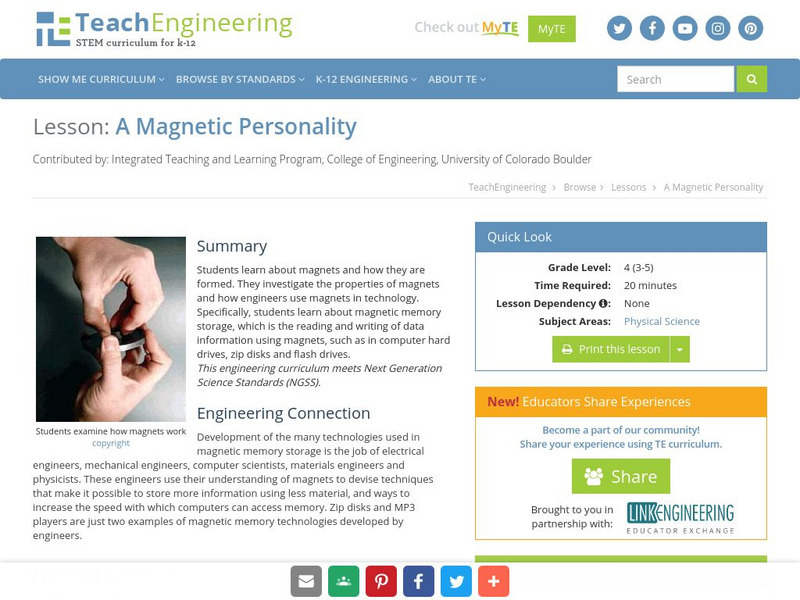TED Talks
Ted: Ted Ed: What Happens When You Remove the Hippocampus?
When Henry Molaison cracked his skull in an accident, he began blacking out and having seizures. In an attempt to cure him, daredevil surgeon Dr. William Skoville removed his hippocampus. Luckily, the seizures did go away- but so did his...
TED Talks
Ted: Ted Ed: What Is Deja Vu? What Is Deja Vu?
There are over 40 theories that attempt to explain the phenomenon of deja vu. Michael Molina explains how neuroimaging and cognitive psychology have narrowed down the theories that could explain that feeling you're having, again. [3:55]
Other
How Many Bytes in Human Memory?
Most will use the computer as a metaphor for the human brain. But how close can a computer come to what we can do? This is an article that addresses that very question.
Other
Tbi Survival Guide: Memory
A site devoted to information for those who have suffered traumatic brain injuries, delves into the brains memory functions.
Other
Aromatherapy
Aromatherapy is the use of natural and high quality plant essential oils to enhance the health of body and mind, and to treat disorders.
Other
Audiblox: Foundational Reading Skills
What types of reading skills do students need to be successful? This informative site focuses on students with learning disabilities. Explore!
Frontiers Media
Frontiers: Thanks for the Memories
Everyone wants a good memory but we don't often ask ourselves what memory is for. Let's begin our exploration of why memory is important and how it works with a little memory test: Do you remember what you learned in class last...
TED Talks
Ted: Ted Ed: The Great Brain Debate
Throughout history, scientists have proposed conflicting ideas on how the brain carries out functions like perception, memory, and movement. Is each of these tasks carried out by a specific area of the brain? Or do multiple areas work...
Other
Litemind: Creative Problem Solving With Scamper
SCAMPER is a technique you can use to spark your creativity and help you overcome any challenge you may be facing. In essence, SCAMPER is a general-purpose checklist with idea-spurring questions - which is both easy to use and...
ReadWriteThink
Read Write Think: The Mysteries of Memory Memorization Techniques That Work
Contains plans for four lessons that teach learners about memory and techniques to better remember information. In addition to objectives and standards, this instructional plan contains links to sites used in the lessons as well as...
Other
Society for Neuroscience: Brain Facts [Pdf]
This is a publication on the human brain and how it works. Gives details on the neuron, how the senses interact with the brain and much more. PDF (requires Adobe Reader).
National Institutes of Health
Nih Curriculum Supplement for Middle School: The Brain: Our Sense of Self
Through scientific inquiry this module introduces many concepts about the brain, its functions, and its importance in the sense of self. Included are a teacher's guide, interactive student web activities, and resources.
PBS
Pbs Teachers: Scientific American: Super People: Memory Matters
Investigate the three types of memory: sensory, short-term and long-term, and explore tricks and techniques that can improve long-term memory. Conduct five basic challenges to test, explore and improve memory skills.
PBS
Pbs Teachers: Scientific American: The Wonder Pill: Placebo 2
Identify the physiology of how a placebo affects the brain through "ritual expectations." Perform an experiment to explore how the manner in which a ritual is presented may affect the outcome of its success.
PBS
Pbs Teachers: Scientific American: Memory Tests
Explore scientific research saying that continued brain activity may delay or slow the loss of memory function. Investigate and practice different techniques to increase recall.
PBS
Pbs Teachers: Scientific American: Don't Forget! Memory Tests 9 12
Explore scientific research that says continued brain activity may delay or slow the loss of memory function. Investigate and practice different techniques to increase recall.
Other
Newsbreak Special Health Report on the Brain and Aging
This article discusses the relationship between memory and the aging of the brain.
Other
Graphic Greats: Photo Treatment
This resource presents an article about the use of photos in documents.
National High Magnetic Field Laboratory
Magnet Academy: Magnetic Core Memory
Magnetic core memory was developed in the late 1940s and 1950s, and remained the primary way in which early computers read, wrote and stored data until RAM came along in the 1970s. (Java tutorial)
National High Magnetic Field Laboratory
Magnet Academy: Magnetic Core Memory 1949
At the dawn of the computer age, magnetic core memory helped make data storage possible, and showed surprising staying power in a field where components are constantly being replaced by new and improved products.
Seeker
Seeker: Creating False Memories in Mice
Article reports on a study in which scientists implanted false memories in the minds of rats. Includes a video.
Wisc-Online
Wisc Online: Psychology: Brain & Behaviour
Test your speed in this game reviewing brain and behavior terms and concepts.
TeachEngineering
Teach Engineering: A Magnetic Personality
Learners learn about magnets and how they are formed. They investigate the properties of magnets and how engineers use magnets in technology. Specifically, students learn about magnetic memory storage, which is the reading and writing of...
Computer Hope
Computer Hope: Computer Buying Help
This section of Computer Hope is designed to help users understand and make better decisions when purchasing computer hardware, software and computers. Be sure to review the section 'Buying locations' which gives you tips and what to...












![Society for Neuroscience: Brain Facts [Pdf] Activity Society for Neuroscience: Brain Facts [Pdf] Activity](https://content.lessonplanet.com/knovation/original/113866-cd2169bec6c0105fc678c671521bd642.jpg?1661266885)








